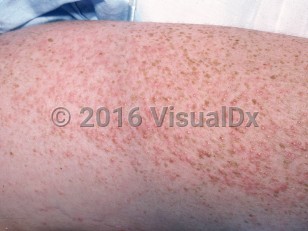There are different types of miliaria, each classified by the depth of occlusion of the eccrine duct.
- Miliaria crystallina results from superficial obstruction of the eccrine duct within the stratum corneum. It presents as superficial vesicles with no surrounding erythema.
- Miliaria rubra is caused by obstruction of the eccrine duct within the epidermis. It is the most prevalent form of miliaria and is characterized by 2-4 mm erythematous and uniform papules or papulovesicles with background erythema.
- Miliaria pustulosa is a variant of miliaria rubra that occurs when pustules form and may indicate superimposed infection.
- Miliaria profunda results from deeper obstruction of the sweat duct at the dermal-epidermal junction. It presents as skin-colored papules with possible associated hypohidrosis or anhidrosis.
Miliaria rubra has been reported to occur in newborns with type 1 pseudohypoaldosteronism, a condition caused by defective transepithelial sodium transport resulting in inflammation of eccrine glands from excessive salt exposure. This typically resolves upon stabilization of disease.
In infants, miliaria most commonly involves the face, neck, and trunk.



 Patient Information for
Patient Information for 
